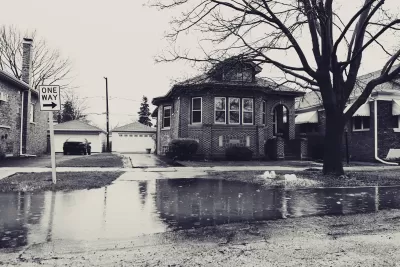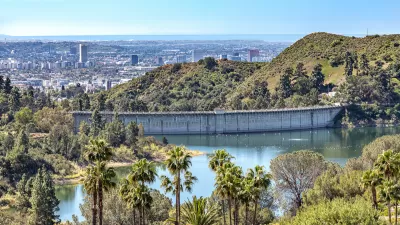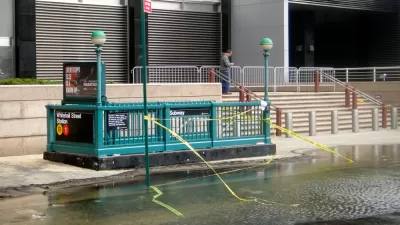The city’s geography and the growing intensity of storms due to climate change are making it difficult for local officials to prevent neighborhood flooding and wastewater spills.

In an article for the Chicago Tribune and republished in Governing, Michael Hawthorne and Adriana Pérez describe how Chicago’s efforts to mitigate higher flood risks are not keeping up with the effects of climate change.
The Deep Tunnel, a $3.8 billion subterranean flood control project officially known as the Tunnel and Reservoir Plan (TARP), is designed to prevent flooding and keep wastewater and industrial runoff out of local waterways. But earlier this month, during a heavy storm, 20 overflow pipes in Cook County spewed runoff and waste. “Recent storms suggest rain can now fall so quickly that stormwater tunnels can’t move runoff to the reservoir fast enough to prevent sewage overflows and basement backups in the 252 square miles of Chicago and County served by the main part of the system.”
The prognosis is grim: “In 2010, [Don] Wuebbles and other scientists hired by former Mayor Richard M. Daley concluded that rains of more than 2.5 inches a day, the amount that can trigger sewage dumping into Lake Michigan, were expected to increase by 50 percent by 2039.”
As the authors point out, “Like so many other societal ills, the consequences hit the poorest Chicagoans the hardest. After a major storm in 2013, city officials determined the damages were concentrated in low- and middle-income census tracts on the West and South sides, similar to where many 311 calls originated after the more recent storms.”
The Water Reclamation District is partnering with local governments to build more retention basins, particularly in areas where flooding has occurred repeatedly.
FULL STORY: Chicago’s Flood-Control Project Can’t Contend With Climate Change

Trump Administration Could Effectively End Housing Voucher Program
Federal officials are eyeing major cuts to the Section 8 program that helps millions of low-income households pay rent.

Planetizen Federal Action Tracker
A weekly monitor of how Trump’s orders and actions are impacting planners and planning in America.

Ken Jennings Launches Transit Web Series
The Jeopardy champ wants you to ride public transit.

‘Smart Surfaces’ Policy Guide Offers Advice for Building and Maintaining Urban Tree Canopies
Healthy, robust tree canopies can reduce the impacts of extreme heat and improve air quality.

New Jersey Lawsuit Targets Rent-Setting Algorithms
The state of New Jersey is taking legal action against landlords and companies that engage in what the state’s Attorney General alleges is illegal rent fixing.

Washington Legislature Passes Rent Increase Cap
A bill that caps rent increases at 7 percent plus inflation is headed to the governor’s desk.
Urban Design for Planners 1: Software Tools
This six-course series explores essential urban design concepts using open source software and equips planners with the tools they need to participate fully in the urban design process.
Planning for Universal Design
Learn the tools for implementing Universal Design in planning regulations.
Heyer Gruel & Associates PA
Ada County Highway District
Institute for Housing and Urban Development Studies (IHS)
City of Grandview
Harvard GSD Executive Education
Toledo-Lucas County Plan Commissions
Salt Lake City
NYU Wagner Graduate School of Public Service




























